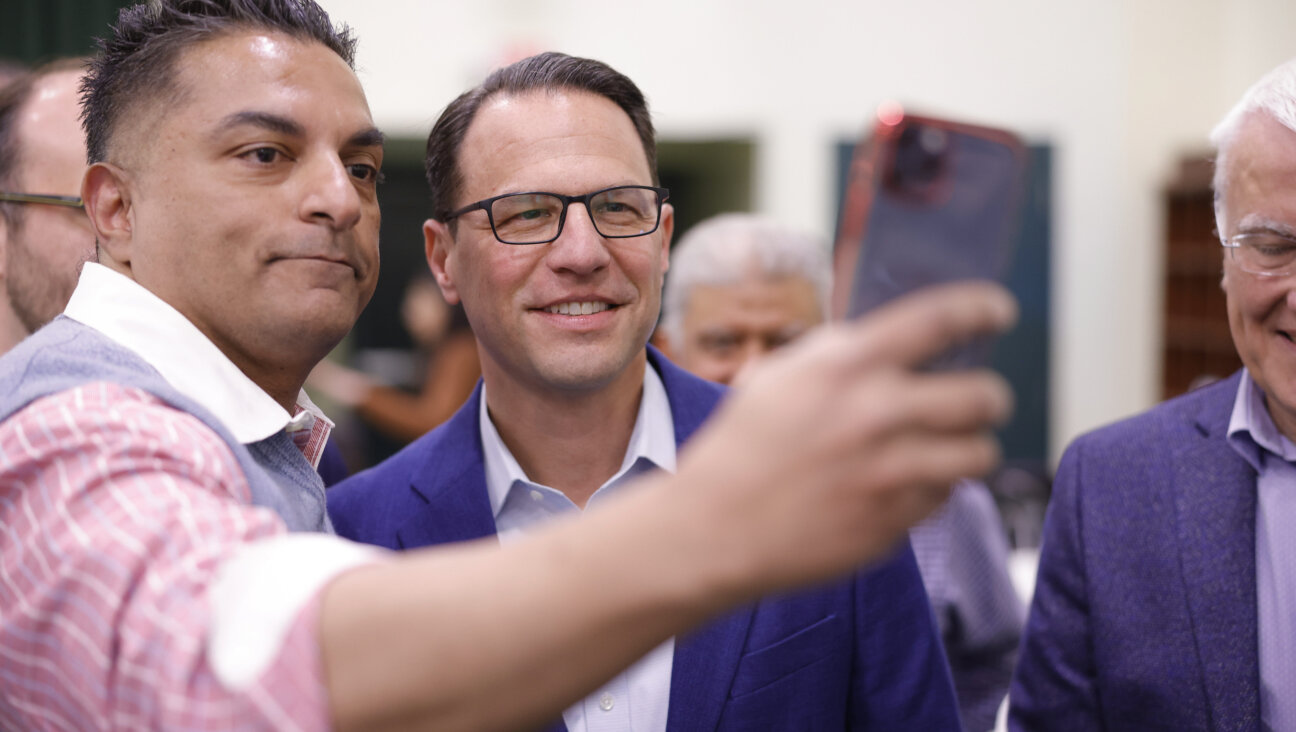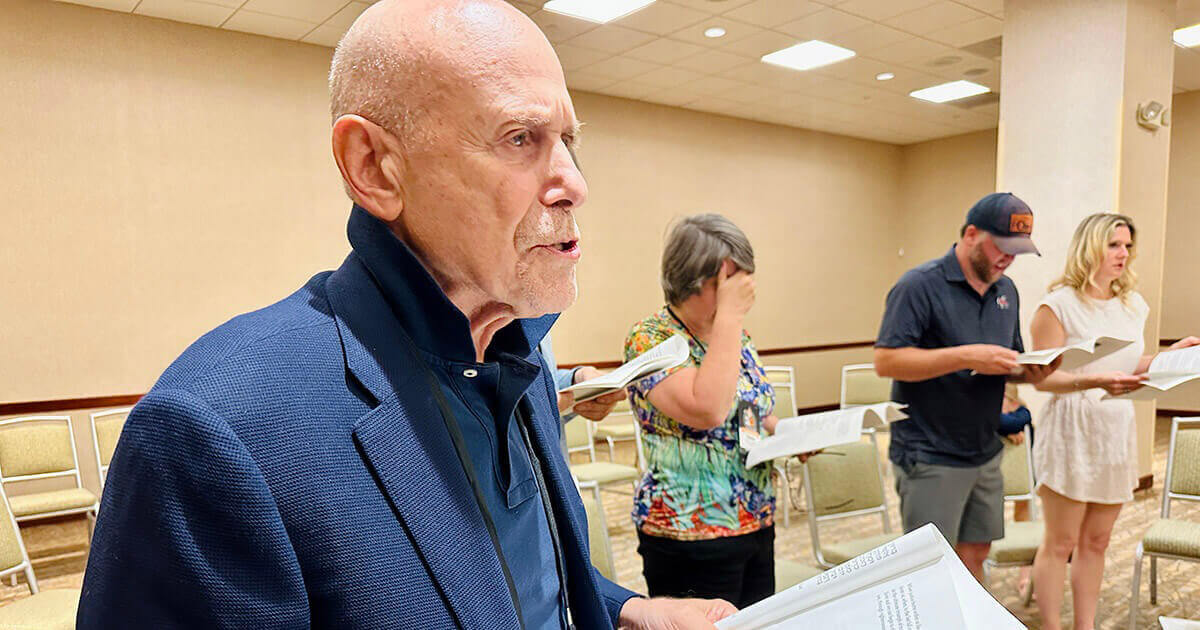PR Group Clashes With Jerusalem On Image of Israel
The Israeli government and a public relations organization that is working to improve Israel’s image could be headed for a showdown at next week’s gathering of Jewish federation leaders in Cleveland.
Jennifer Laszlo Mizrahi, founder and president of The Israel Project, is set to participate in a panel discussion November 16 with Gideon Meir, the Israeli Foreign Ministry’s deputy director for public affairs, at the General Assembly of the United Jewish Communities. A number of people close to the situation say the Israeli foreign ministry recently has decided to cut off its cooperation with Mizrahi’s organization, after a series of disagreements about the best way to portray Israel in the media.
Meir declined to discuss details when contacted by the Forward, but did say that, “We have some differences, which we are going to solve in a civilized manner.” An American nonprofit organization, The Israel Project receives no money from the Israeli government, but it has closely coordinated its efforts in the past. Meir said he is planning to meet with Mizrahi next week.
Sources familiar with the situation said that one recent disagreement stemmed from the desire of The Israel Project to conduct a poll to gauge American attitudes regarding a federal counterintelligence probe involving the American Israel Public Affairs Committee, the community’s most influential pro-Israel lobbying organization. The Israeli government, according to the sources, was opposed to any step that would attract attention to the controversy.
For her part, Mizrahi said there has been no change in the relationship with the Israeli government thus far, and she said disagreements have occurred only because, “people are people. One day you’re hot with someone, the next you’re not.”
Since being launched in March 2002, The Israel Project has become a resource for many local Jewish communities working to improve Israel’s image. Guided by polling that it has commissioned, The Israel Project has released guides and held conferences to explain the best words to use — democracy and freedom — when talking about Israel and the best ways to get the media to report positive stories about Israel. The organization has quickly raised $4 million and generated oodles of press clippings.
David Harris, executive director of the American Jewish Committee, which was an early funder of The Israel Project, said, “we admire the passion and commitment they bring to issues of common concern.”
In a business where sweet talking and careful interactions are everything, though, Mizrahi’s group has been criticized by many for being too aggressive and putting forward the wrong images. There has been public griping from the Israeli government that Mizrahi has pushed media coverage for stories that the government would prefer to fizzle out quietly — like the ruling from the International Court of Justice on the security fence. A number of Jewish communal insiders complained about the way Mizrahi has publicized her work without regard for the sensitive context in which she is working.
“There have been times,” one community insider said, “when she has been so aggressive that you wonder if she is more interested in promoting Israel or The Israel Project.”
Mizrahi countered that many of the complaints stem from a lingering anxiety in the Jewish community about giving even the appearance of influencing the media. She said her organization will have no shame in pushing a more aggressive approach.
“There is no doubt that The Israel Project always wants to be in front of the curve,” she said. “If there is an opportunity to get good press for Israel, we will always work to get good press for Israel.”
Mizrahi’s penchant for pumping up a story caused some tensions during the recent hubbub at Duke University surrounding a conference of the Palestinian Solidarity Movement, an organization that has been accused of spouting anti-Israel and antisemitic sentiments.
The Jewish federations of North Carolina gathered a month before the conference to formulate a cohesive strategy for confronting the arrival of Palestinian activists. Looking at the experience of other campuses, the federations agreed that it would be best to keep the story quiet and not push the university to cancel the conference.
“We thought it would be smart to not make much noise,” said Orit Ramler, director of the Durham-Chapel Hill Jewish Federation. “We heard that in previous Palestinian conferences they got all the promotion from the Jewish community.”
But a few weeks after the community had come to its decision, Mizrahi, who is from Durham, N.C., arrived on the scene and unleashed a publicity blitz. The Israel Project sent out a press release condemning Duke for allowing the conference, and also ran a series of 30-second ads on local television.
Mizrahi says that The Israel Project passed all its plans by the local communities, but the full-court press still seemed too aggressive for some.
“We were surprised when they suddenly appeared,” said Marilyn Chandler, executive director of the Greensboro Jewish Federation. “They came in with an agenda that wasn’t necessarily a shared agenda. Their agenda was high publicity, high impact.”
Chandler says that in the end she does not know if The Israel Project chose the right course. But Ramler, the director of the Durham Federation, said The Israel Project was a great resource once the media started following the story on their own.
Similar controversies arose before the situation at Duke. At the Democratic and Republican national conventions, for instance, the Israeli government had decided that a low-profile approach would be best for Israel. Mizrahi, however, ran a full media campaign with 350 television ads during the Republican convention alone.
It should be expected, Mizrahi said, that a new organization will ruffle some feathers while finding its way: “A young, independent organization will have its growing pains.”
Thousands of Jewish federation leaders are set to descend on Cleveland for next week’s General Assembly of the United Jewish Communities.
The G.A., as it is called, is an occasion for federation professionals and volunteers to hobnob with colleagues and attend workshops and discussions reflecting the work of federations and their many partners — from boosting fund raising to serving the elderly and advocating for Israel on campus.
This year’s conference, to be held November 14-17, finds the federation system at a crossroads.
The UJC, formed five years ago through the merger of the Council of Jewish Federations, United Jewish Appeal and United Israel Appeal, is undergoing a transition after the recent accession of its third president, Howard Rieger, former president of the United Jewish Federation of Pittsburgh.
It also comes as the UJC prepares to review the Overseas Needs Assessment and Distribution Committee, which determines allocations to the UJC’s overseas partners — the Jewish Agency for Israel, which runs immigration and absorption in Israel; and the American Jewish Joint Distribution Committee, which runs relief and welfare for Jews abroad. Comprised of a cross-section of federation leaders, the ONAD committee was meant to equip local federation leaders with a deeper understanding of overseas needs so they would help bolster the overseas agencies. But critics say the process has become fraught with politics, pitting the overseas partners against each other for a pool of funds that has not increased meaningfully.
Rieger has said he intends to shore up overseas funding. In a recent interview, he said ONAD’s fate will be determined by a committee.
Meanwhile, federations are reporting an upswing in their annual fund- raising campaigns, but attendees still will look to the General Assembly for inspiration —specifically, for evidence as to whether Rieger can chart a vision for the federation system that many say has yet to be clearly elucidated and put into practice. “Right now is the real turning point,” said Barry Shrage, president of Boston’s Combined Jewish Philanthropies.
A message from our editor-in-chief Jodi Rudoren

We're building on 127 years of independent journalism to help you develop deeper connections to what it means to be Jewish today.
With so much at stake for the Jewish people right now — war, rising antisemitism, a high-stakes U.S. presidential election — American Jews depend on the Forward's perspective, integrity and courage.
— Jodi Rudoren, Editor-in-Chief






















